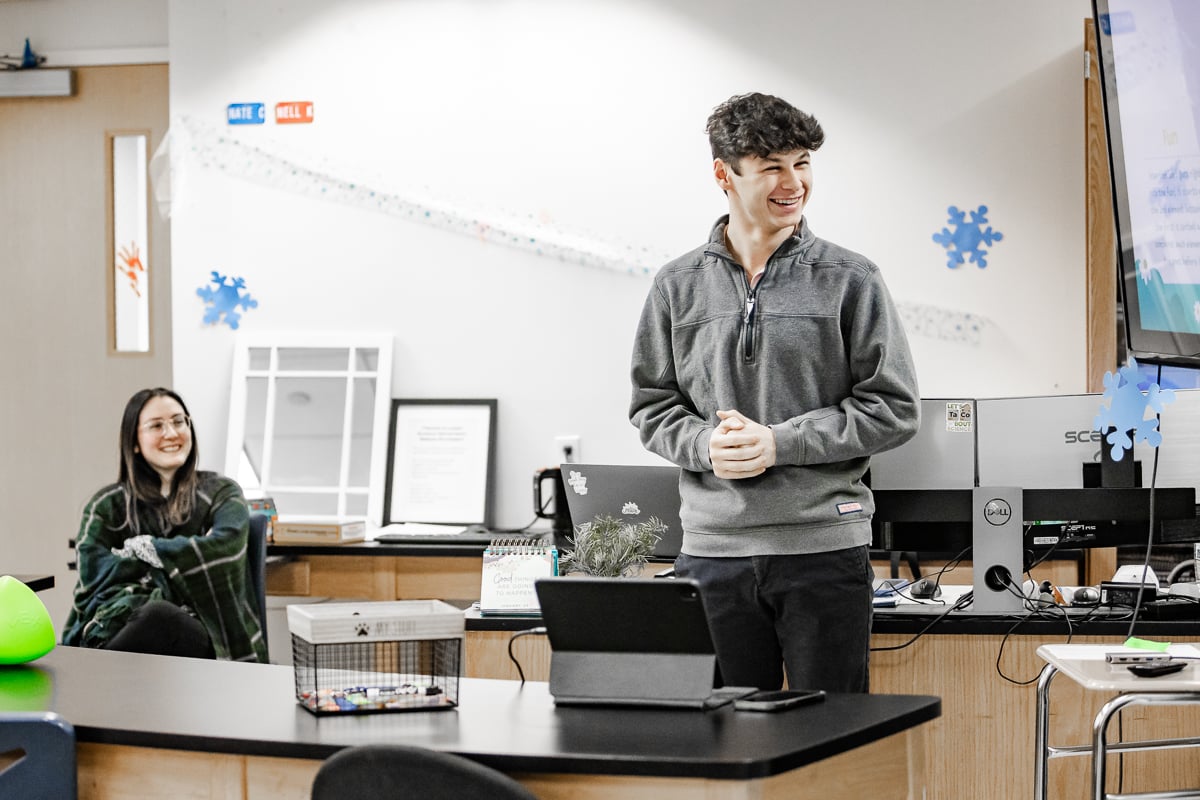10 Questions Every Parent Should Ask at a PreK-12 Open House
09-25-23
Subscribe
Close
Fill out the form below to receive updates on the latest and greatest within the Friends Academy community.

The transition from middle to high school is a significant milestone for everyone. It’s full of new chances to learn, meet friends, and explore new activities and interests. Despite the excitement, you may wonder if your child is actually ready for all the challenges and opportunities that come with high school.
To succeed in high school, your child must be prepared to handle academic and social challenges, exercise emotional intelligence, and gradually become more independent. At Friends Academy, this can look many ways—like your child knowing how to peacefully resolve conflicts, understand the nuances of equity, or execute their service to others and their surroundings.
It isn’t always easy to tell if your child is ready, but some key indicators can help gauge your child’s preparedness. These signs reflect academic skills and emotional maturity, crucial tools for successfully navigating high school.
Ensuring your child is mentally and emotionally ready for high school is just as important as their academic preparation. It’s essential to gauge their excitement about starting high school. Do they look forward to it? Have they set goals that high school might help them achieve? Understanding what drives them can significantly affect your child’s success.
When students are actively engaged and involved in their education, their interest, enthusiasm, and commitment increase. The students who get the most out of high school get involved and pursue both their academic and social interests. Extracurricular activities like clubs, sports, and musical ensembles help students with academic achievement, character development, social skills, and more.
Encouraging students to engage actively with their education not only supports their academic success but also fosters a more enjoyable and fulfilling learning experience.
Grades, test scores, and teacher feedback are all important components when evaluating a student’s academic preparedness for high school.
During the next four years, each student can expect a course load that is rigorous and demanding; they’ll need a strong academic background and track record, including mastery of core subjects like math, science, language arts, and social studies to support them as they are challenged to learn more advanced concepts in these subjects.
Assessing their ability to manage a heavier workload and more complex materials is crucial. To gauge your child’s readiness, consider connecting with their middle school teachers for insights into their mastery.
Consider the following questions: Can they solve more challenging math problems? Can they take a deeper level of analysis in their research paper? Are they able to meet high school entry standards for reading and writing?
High school requires more independence and self-motivation from each student. To thrive in this environment, students need to know how to manage their time effectively, complete assignments independently, and take responsibility for their learning.
How do you measure these qualities?
Start by considering their organizational skills and ability to meet deadlines. Are they managing their work and meeting expectations? Teachers often assess these skills, so feel free to discuss with them for additional insights.
Another critical aspect to consider is self-advocacy. High school students should be able to voice their needs, ask questions, and seek help when needed. Therefore, examining your child's ability to articulate thoughts, request teacher support, and participate actively in class discussions is beneficial to their future success.
While emotional intelligence is a complex and nuanced quality, its significance and potential for impact extends far beyond high school.
High school can be emotionally challenging as students face daily social pressures, academic demands, physical changes, hectic schedules, and various other challenges.
Observe your child's emotional resilience and ability to handle stress, conflicts, and peer pressure. Can they communicate effectively, make responsible decisions, and cope with setbacks or disappointments?
Emotional maturity is a valuable and universal skill. If your child can handle complex emotions at age-appropriate levels across different life situations, they are likely equipped to reach the level of emotional maturity needed in an academic setting.
Transitioning to high school, students encounter a broader and more diverse social landscape than ever before. High schools bring together people from various academic, social, economic, and cultural backgrounds, offering rich opportunities for social engagement that demand robust social skills.
Consider whether your child possesses the social abilities necessary to forge new friendships, collaborate with unfamiliar peers, and engage positively with students across different age groups. And more importantly, can they do it every day?
Moreover, communicating with adults, including teachers and staff, requires a distinct set of social skills compared to peer interaction. Your child needs to be able to communicate well and develop relationships with teachers and staff, which actively contributes to a well-rounded and enriching high school experience.
Students are best prepared for high school when they experience a consistent education journey from Pre-K through 8th grade. This stability enables them to focus less on adjusting to new environments and more on enhancing their understanding of the world.
At Friends Academy, we provide a seamless curriculum from Pre-K to Upper School, emphasizing intentional growth year after year through embedded Quaker values, such as integrity, community, equality, and stewardship. This approach is part of why we’re the #1 private PreK-12 school in Nassau County and backed by 147 years of academic excellence.
We encourage you to learn more about the benefits of this approach here:
To get a deeper look into how Friends Academy prepares students for high school (Upper School), we invite you to download our resource, The Family's Guide to Middle School at Friends Academy.
In this guide, we'll explore:
Did you enjoy this post? Here are a few more we think you'd be interested in:
Fill out the form below to receive updates on the latest and greatest within the Friends Academy community.